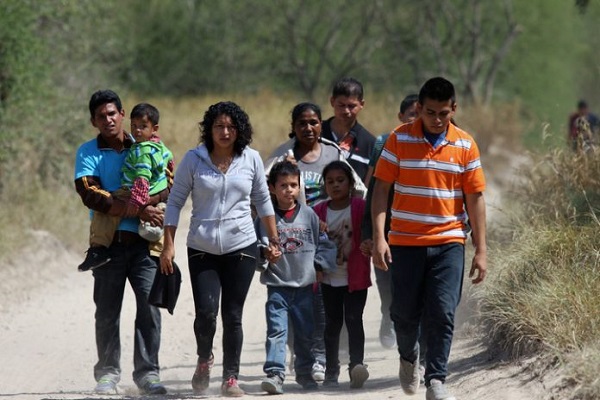illegal immigration
Biden Announces Widespread Amnesty Plan for Illegal Immigrants

From Heartland Daily News
President Joe Biden announced a new plan on Tuesday that will fast track a path to citizenship for hundreds of thousands of foreign nationals who’ve been living in the country illegally for more than 10 years and married a U.S. citizen. He also expanded protections for DACA recipients, according to several reports.
In a statement issued by the White House, the president blamed Republicans in Congress for not securing the border and fixing the “broken immigration system.”
Because of Republicans putting “partisan politics ahead of national security,” he announced additional measures to implement deportation protections to some illegal foreign nationals. Doing so reflects his commitment to “expanding lawful pathways and keeping families together,” he said, arguing that those who entered the country illegally “who have been in the United States for decades, paying taxes and contributing to their communities, are part of the social fabric of our country.”
His new action will help “people who have been here many years to keep American families together and allow more young people to contribute to our economy,” according to the statement.
The Wall Street Journal first reported that the plan zeroes “in on the population of mixed-status families, where typically the children and one parent are U.S. citizens, because they believe that demographic is the most compelling, according to administration officials and advocates who have spoken with them.”
One way to do this would be to implement another parole policy called “parole in place,” enabling illegal foreign national spouses of U.S. citizens to obtain green cards and U.S. citizenship. They would also receive work permits and deportation protections, according to several reports on Monday.
In order to be eligible for the new parole program, noncitizens, as of June 17, 2024, must have resided in the U.S. for 10 or more years and be legally married to a U.S. citizen. On average, those who are eligible have resided in the U.S. for 23 years, according to the White House statement released Tuesday.
Advocates in support of providing amnesty estimate there are more than one million spouses who could apply to the new parole program, the Journal reported.
The announcement at the White House came on the 12th-year anniversary of former President Barack Obama creating by executive order the Deferred Action for Childhood Arrivals program (DACA). DACA shielded children from deportation who were brought into the country illegally by their parents and has been in litigation for 12 years. A federal judge has twice ruled that the program is illegal. The most recent ruling was in a multi-state lawsuit led by Texas to end DACA once and for all, The Center Square reported. The case is expected to ultimately be decided by the U.S. Supreme Court.
Biden announced an expanded program for DACA recipients to “streamline the process” for them “and other undocumented immigrants to request waivers that would make it easier for them to obtain temporary visas, such as H-1B visas for high-skilled workers,” CBS News reported.
DACA recipients who earned a degree at an accredited U.S. institution of higher education and who received an offer of employment from a U.S. employer in a field related to their degree will be able to quickly receive work visas, according to the White House statement.
Numerous reports suggest between 700,000 and 800,000 people living in the U.S. are DACA recipients. The Los Angeles Times reports there are 578,680 DACA recipients on record with the U.S. Citizenship and Immigration Services as of March 2023.
After announcing earlier this month he was limiting asylum claims, the president is now proposing a measure to ensure those in the country illegally aren’t deported. Both announcements made five months before the election aren’t solutions but political ploys and will only incentivize illegal immigration, critics argue.
“It is definitely an incentive and will drive more illegal immigration,” former acting director of Immigration and Customs Enforcement Tom Homan told The Center Square. “In a time where we are facing historic numbers on the southern border, President Biden announces yet another giveaway program, another reward for illegally entering this country.
“This reinforces that you can enter this country illegally and if you can hide out long enough, you get legal status. This will drive more illegal immigration and they know that and that is why they are doing it.”
If the president really cared about border security and reforming immigration law, he would “reimplement the Migrant Protection Protocols; … restore Asylum Cooperative Agreements with Central American partners; finish construction of new border wall system that Congress funded years ago [which he halted]; and … end mass catch-and-release,” U.S. House Committee on Homeland Security Chairman Mark Green, R-TN, said in a statement. The president “could stop the flow of hundreds of thousands entering this country via unlawful mass-parole programs created by his DHS secretary. And he could encourage Senate Democrats to pass H.R. 2, the only border bill passed by either house of the 118th Congress, to further close loopholes and end avenues for exploitation of our borders by the cartels.
“But he won’t, because the rabidly anti-enforcement, open-borders left is calling the shots for the Biden administration. And the rest of us are paying the price.”
Any executive actions taken related to newly created parole programs or DACA are likely to be challenged by Republican attorneys general.
Originally published by The Center Square. Republished with permission.
illegal immigration
US Notes 2.5 million illegals out and counting

President Trump’s Department of Homeland Security is marking what officials are calling a landmark moment in U.S. immigration enforcement, announcing Wednesday that more than 2.5 million illegal aliens have now left the country since Trump returned to the Oval Office in January. DHS Secretary Kristi Noem said the surge reflects a sweeping, sustained crackdown driven by Immigration and Customs Enforcement teams that — according to internal tallies — have already removed more than 605,000 illegal aliens, most of whom were facing criminal charges or carrying prior convictions. Nearly two million more have opted to self-deport, a wave Noem attributes to stepped-up enforcement and the administration’s aggressive public messaging. She again urged those still in the country illegally to use the government’s CBP Home app, which offers a free one-way flight and a $1,000 stipend to expedite departure.
Senior DHS officials say arrests have climbed as well, with almost 600,000 illegal aliens taken into custody since January 20. “Illegal aliens are hearing our message to leave now,” DHS official McLaughlin said this week. “They know if they don’t, we will find them, we will arrest them, and they will never return.”
The administration argues the impact is being felt far beyond immigration courts and detention facilities, pointing to the U.S. housing market as one of the clearest signs of change. For six straight months, DHS says not a single illegal alien has been released into the interior from the southern border — a dramatic shift after years of mass inflows under President Biden. That decline, they say, is finally filtering into rent and home-price data after years of punishing increases.
Housing and Urban Development Secretary Scott Turner said Americans have now seen four consecutive months of rent decreases — the first sustained drop in years — as fewer illegal aliens compete for housing. Vice President JD Vance emphasized the connection even more bluntly: “The connection between illegal immigration and skyrocketing housing costs is as clear as day. We are proud to be moving in the right direction. Still so much to do.”
Research abroad and at home backs up the administration’s argument. Economists in Denmark released findings earlier this year showing that a one-percentage-point rise in local immigration over a five-year period drove private rental prices up roughly 6 percent and home prices up about 11 percent. The Center for Immigration Studies presented similar data to Congress last year, with researcher Steven Camarota testifying that a 5-percentage-point increase in a metro area’s recent-immigrant share was tied to a 12-percent rise in rent for U.S.-born households.
As DHS leaders frame it, Trump’s second-term enforcement machine is reshaping both border policy and household budgets — an approach they say is finally delivering relief to Americans who spent years squeezed by soaring housing costs and unchecked migration.
illegal immigration
EXCLUSIVE: Canadian groups, First Nation police support stronger border security

First Nation police chiefs join Texas Department of Public Safety marine units to patrol the Rio Grande River in Hidalgo County, Texas. L-R: Dwayne Zacharie, President of the First Nations Chiefs of Police Association, Ranatiiostha Swamp, Chief of Police of the Akwesasne Mohawk Territory, Brooks County Sheriff Benny Martinez, Jamie Tronnes, Center for North American Prosperity and Security, Goliad County Sheriff Roy Boyd. Photo: Bethany Blankley for The Center Square
From The Center Square
By
Despite Canadian officials arguing that the “Canada-U.S. border is the best-managed and most secure border in the world,” some Canadian groups and First Nation tribal police chiefs disagree.
This week, First Nation representatives traveled to Texas for the first time in U.S.-Canadian history to find ways to implement stronger border security measures at the U.S.-Canada border, including joining an Operation Lone Start Task Force, The Center Square exclusively reported.
Part of the problem is getting law enforcement, elected officials and the general public to understand the reality that Mexican cartels and transnational criminal organizations are operating in Canada; another stems from Trudeau administration visa policies, they argue.
When it comes to public perception, “If you tell Canadians we have a cartel problem, they’ll laugh at you. They don’t believe it. If you tell them we have a gang problem, they will absolutely agree with you 100%. They don’t think that gangs and cartels are the same thing. They don’t see the Hells Angels as equal to the Sinaloa Cartel because” the biker gang is visible, wearing vests out on the streets and cartel operatives aren’t, Jamie Tronnes, executive director of the Center of North American Prosperity and Security, told The Center Square in an exclusive interview.
The center is a US-based project of the MacDonald-Laurier Institute, the largest think tank in Canada. Tronnes previously served as a special assistant to the cabinet minister responsible for immigration and has a background in counterterrorism. She joined First Nation police chiefs to meet with Texas law enforcement and officials this week.
Another Canadian group, Future Borders Coalition, argues, “Canada has become a critical hub for transnational organized crime, with networks operating through its ports, banks, and border communities.” The Sinaloa and Jalisco New Generation Mexican cartels control the fentanyl, methamphetamine and cocaine business in Canada, partnering with local gangs like the Hells Angels and Chinese Communist Party (CCP)-linked actors, who launder profits through casinos, real estate, and shell companies in Vancouver and Toronto, Ammon Blair, a senior fellow at the Texas Public Policy Foundation, and others said at a coalition event prior to First Nation police chiefs and Tronnes coming to Texas.
“The ’Ndrangheta (Italian Mafia) maintains powerful laundering and import operations in Ontario and Quebec, while MS-13 and similar Central American gangs facilitate human smuggling and enforcement. Financial networks tied to Hezbollah and other Middle Eastern groups support laundering and logistics for these criminal alliances,” the coalition reports.
“Together, they form interconnected, technology-driven enterprises that exploit global shipping, cryptocurrency, and AI-enabled communications to traffic whatever yields profit – narcotics, weapons, tobacco, or people. Taking advantage of Canada’s lenient disclosure laws, fragmented jurisdictions, and weak cross-border coordination, these groups have embedded themselves within legitimate sectors, turning Canada into both a transit corridor and safe haven for organized crime,” the coalition reports.
Some First Nation reservations impacted by transnational crime straddle the U.S.-Canada border. One is the Akwesasne Mohawk Reservation, located in Ontario, Quebec, and in two upstate New York counties, where human smuggling and transnational crime is occurring, The Center Square reported. Another is the Tsawwassen First Nation (TWA) Reservation, located in a coastal region south of Vancouver in British Columbia stretching to Point Roberts in Washington state, which operates a ferry along a major smuggling corridor.
Some First Nation reservations like the TWA are suffering from CCP organized crime, Tronnes said. Coastal residents observe smugglers crossing their back yards, going through the reserve; along Canada’s western border, “a lot of fentanyl is being sent out to Asia but it’s also being made in Canada,” Tronnes said.
Transnational criminal activity went largely unchecked under the Trudeau government, during which “border security, national security and national defense were not primary concerns,” Tronnes told The Center Square. “It’s not to say they weren’t concerns, but they weren’t top of mind concerns. The Trudeau government preferred to focus on things like climate change, international human rights issues, a feminist foreign policy type of situation where they were looking more at virtue signaling rather than securing the country.”
Under the Trudeau administration, the greatest number of illegal border crossers, including Canadians, and the greatest number of known, suspected terrorists (KSTs) were reported at the U.S.-Canada border in U.S. history, The Center Square first reported. They include an Iranian with terrorist ties living in Canada and a Canadian woman who tried to poison President Donald Trump, The Center Square reported.
“Had it been a priority for the government to really crack down and provide resources for national security,” federal, provincial and First Nation law enforcement would be better equipped, funded and staffed, Tronnes said. “They would have better ways to understand what’s really happening at the border.”
In February, President Donald Trump for the first time in U.S. history declared a national emergency at the northern border and ordered U.S. military intervention. Months later, his administration acknowledged the majority of fentanyl and KSTs were coming from Canada, The Center Square reported.
Under a new government and in response to pressure from Trump, Canada proposed a $1.3 billion border plan. However, more is needed, the groups argue, including modernizing border technology and an analytics infrastructure, reforming disclosure and privacy rules to enable intelligence sharing, and recognizing and fully funding First Nation police, designating them as essential services and essential to border security.
“National security doesn’t exist without First Nation policing at the border,” Dwayne Zacharie, First Nations Chiefs of Police president, told The Center Square.
-

 Business1 day ago
Business1 day agoWhat Do Loyalty Rewards Programs Cost Us?
-

 Business14 hours ago
Business14 hours agoLand use will be British Columbia’s biggest issue in 2026
-

 Business11 hours ago
Business11 hours agoMainstream media missing in action as YouTuber blows lid off massive taxpayer fraud
-

 Censorship Industrial Complex2 days ago
Censorship Industrial Complex2 days agoUS Under Secretary of State Slams UK and EU Over Online Speech Regulation, Announces Release of Files on Past Censorship Efforts
-

 Energy14 hours ago
Energy14 hours agoWhy Japan wants Western Canadian LNG
-

 Haultain Research1 day ago
Haultain Research1 day agoSweden Fixed What Canada Won’t Even Name
-

 Business11 hours ago
Business11 hours agoStripped and shipped: Patel pushes denaturalization, deportation in Minnesota fraud
-

 Energy2 hours ago
Energy2 hours agoRulings could affect energy prices everywhere: Climate activists v. the energy industry in 2026




